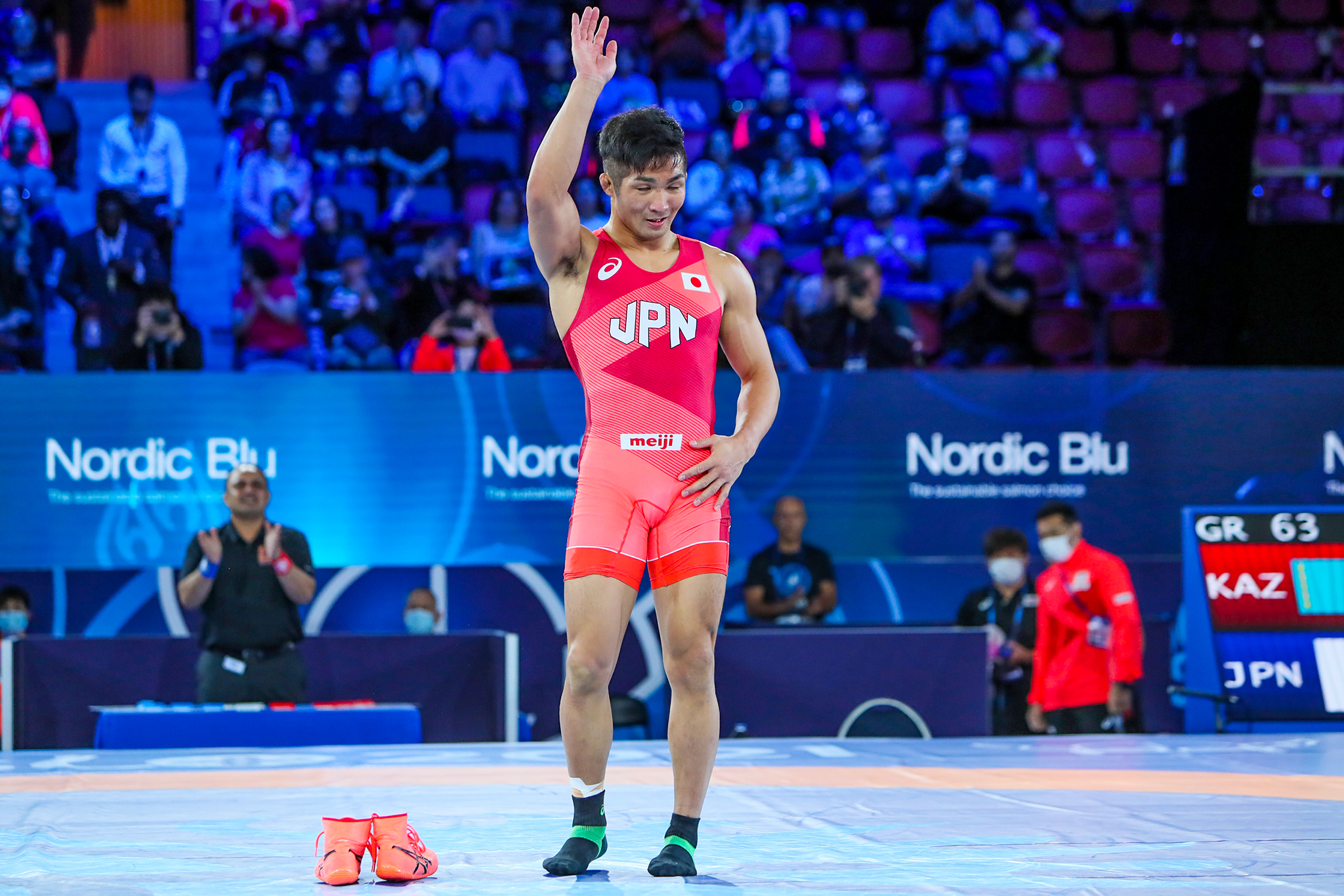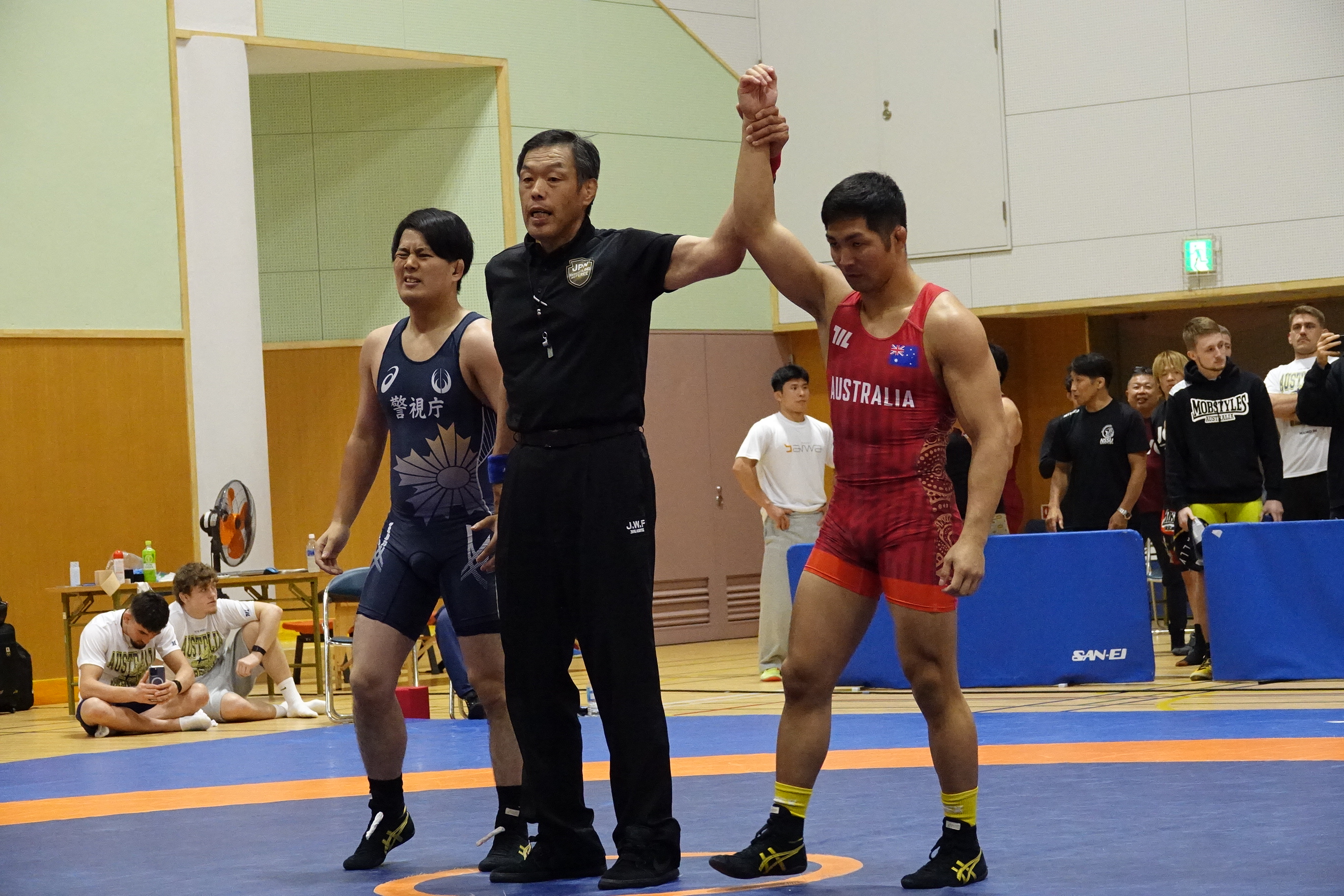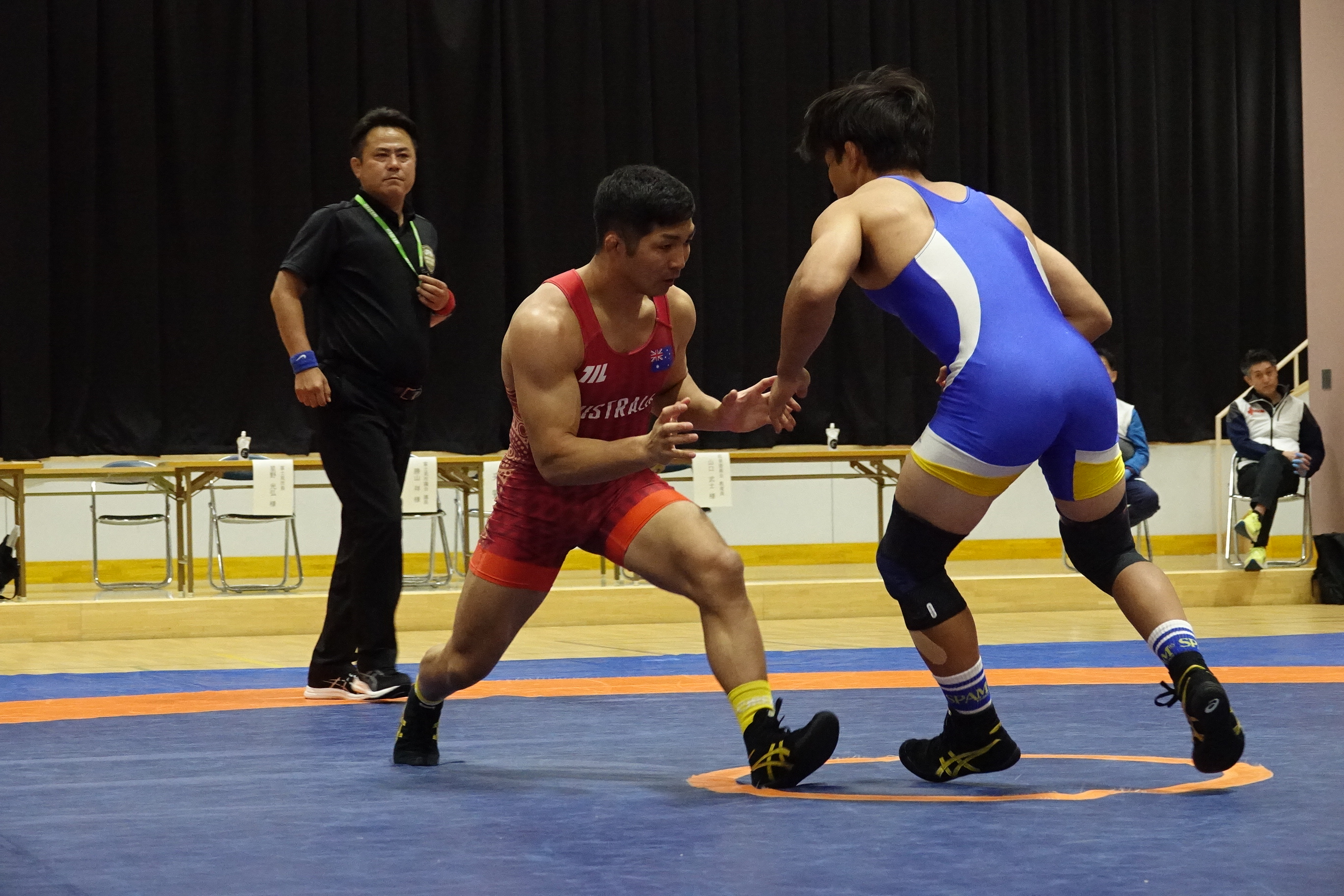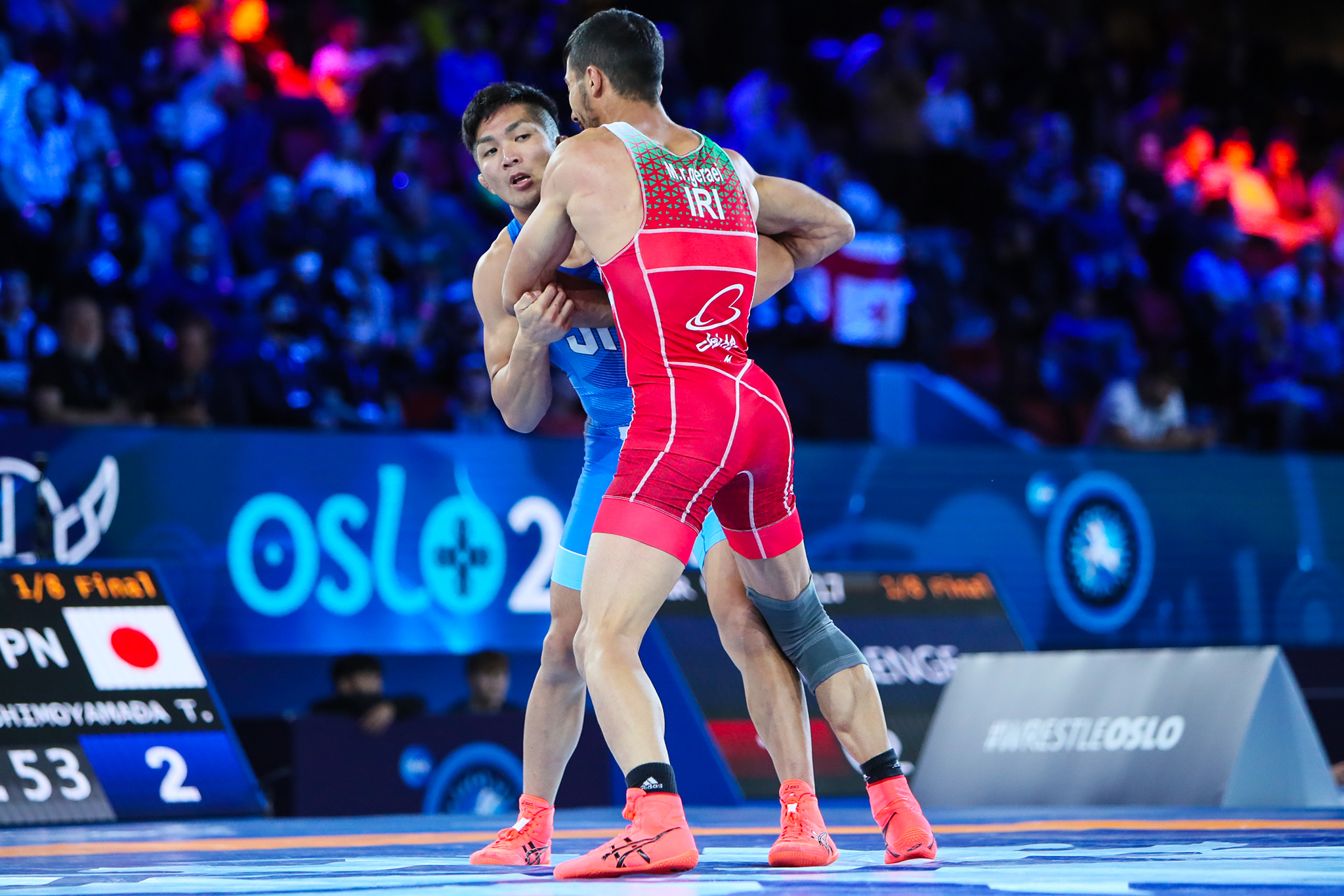Youngsters Nazaryan, Jafarov take big steps with European gold
Sunday, April 23, 2023 - 22:05 By Vinay Siwach

ZAGREB, Croatia (April 23) -- It's mind-blowing that 21-year-old Edmond NAZARYAN (BUL) has reached the final of every European Championship he's participated in.
In 2020, his first year of eligibility at the senior level, he won the European Championships. Two years later, he fell short and finished with a silver medal, but he made amends by defeating world champion Victor CIOBANU (MDA) in Zagreb on Sunday to win his second European title in three years. In the gold medal bout, Nazaryan dominated his opponent, winning 13-0 in just two minutes and two seconds.
"I competed at all the European and World Championships after that [winning Euros in 2020]," Nazaryan said. "In 2021 I had an injury, that's why I missed those tournaments. In 2022, I came back to a new weight class. I won two silver medals. And this year I already got one gold in a new weight class."
A win against Ciobanu may not be a surprise but the way Nazaryan destroyed Ciobanu, a big thrower himself. Ciobanu, clearly struggling with the second-day weight cut at 60kg, was called passive after Nazaryan scored an early stepout. Nazaryan went on to get two points for a correct throw from par terre, executed a suplex, and locked Ciobanu's arm for another throw and the win.
Ciobanu had no clue what hit him. When Moldova challenged the final call, the score was changed from 9-0 to 13-0 in Nazaryan's favor.
"I was getting ready to wrestle for the whole match," Nazaryan said. "There were no specific tactics. I just went out there to wrestle with all my soul. I know his wrestling style. He is really good and quick."
Edmond's father, Armen NAZARYAN, who is a two-time Olympic, three-time world and six-time European champion, jumped around in the stands elated as his son won his second European title at the age of 21 years.
"My father is a great person," he said. "He is my motivation. I should do everything I can to make him happy."
Perhaps winning medals at World Championships and Olympic Games is one way. And for that, Nazaryan says he will have to prepare harder.
"This is just one of the steps that we accomplished together with the team," he said. "But we still have important preparations for the World Championships because there I will get the chance to win the Olympic license."
 Hasrat JAFAROV (AZE) defeated Joni KHETSURIANI (GEO), 3-2 to win the 67kg gold medal. (Photo: UWW / Kadir Caliskan)
Hasrat JAFAROV (AZE) defeated Joni KHETSURIANI (GEO), 3-2 to win the 67kg gold medal. (Photo: UWW / Kadir Caliskan)
Another 2002-born wrestler who clinched the gold medal in Zagreb was Hasrat JAFAROV (AZE). Jafarov, the U20 and U23 world champion, defeated Joni Khetsuriani (GEO), 3-2, in the gold medal bout.
Jafarov did not get off to an ideal start as he was put in par terre first and then gave up a stepout when Khetsuriani used Jafarov's momentum to push him out.
Jafarov got the par terre advantage 30 seconds into the second period but failed to score any points. A minute later, Khetsuriani attempted an arm throw but could not get Jafarov in danger position. Khetsuriani tried to push Jafarov out but fell on the mat. Jafarov scored a go-behind for two points and led 3-2.
The world bronze medalist defended that lead for the remaining 75 seconds to claim his first European title after finishing with a bronze medal last year.

At 97kg, world champion Artur ALEKSANYAN (ARM) returned to the top of the podium at the European Championships after three years as he defeated defending champion Kiril MILOV (BUL) 5-1 in the gold medal bout.
After missing the 2021 and 2022 editions of the tournament, Aleksanyan returned with a dominant performance and reached the final. Milov threatened to shock Aleksanyan in the final as he scored a takedown 10 seconds into the bout but Aleksanyan challenged his go-behind. On review, it was clear that Milov used his leg to trip Aleksanyan.
Milov was called for the first forced par terre and Aleksanyan used a trap-arm gut to score via exposure and a roll which gave him a 5-0 lead. Aleksanyan was put in par terre in the second period and when Milov was trying to get a front headlock, Aleksanyan got on his knees and out of the hold.
There was no further trouble for Aleksanyan in the bout as he calmly defended his lead and win his sixth European title.

World champion Burhan AKBUDAK (TUR) won his first European title after beating Yaroslav FILCHAKOV (UKR), 3-3, in a thrilling 82kg final.
Filchakov was put in par terre in the first period but Akbudak could not get a turn to extend his 1-0 lead. The referees put Akbudak in par terre in the second period, giving Filchakov a 1-1 criteria lead. In a stunning show of strength, he managed to turn Akbudak and take a 3-1 lead with 1:55 remaining in the bout.
In a rare third passivity of the bout, Akbudak asked Filchakov to be in par terre. A tired Filchakov defended Akbudak's attempt to get a turn for 25 seconds but Akbudak attempted one last time close to the zone and got the turn. He now led 3-3 on criteria.
Akbudak's gold medal was Turkiye's third of the tournament in Greco-Roman which propelled it to the team title with 155 points. Azerbaijan finished second with 145 points and Georgia was third, finishing with 124 points.
At 72kg, Ulvi GANIZADE (AZE) denied Ibrahim GHANEM (FRA) a historic gold medal after he won the final 7-7, surviving a late scare by Ghanem.
The French wrestler was looking to become the first Greco-Roman European champion for France since 1995. He had already created history on Saturday by reaching the final, the first French Greco wrestler to achieve the feat since 1997.
No one would have given a chance to Ghanem against world silver medalist Ganizade who led 7-0 at the break after two stepouts, a point for passivity and a mesmerizing four-point throw from par terre.
But Ghanem began mounting a comeback in the second period when he was awarded the par terre against Ganizade. He got only a single turn from par terre but that gave him some cushion to score as the scoreboard led 7-3.
Ganizade was penalized for twisting the fingers and later Ghanem added a stepout to close the gap to 7-5. He scored another stepout with 12 seconds left and one more point was added for Ganizade's fleeing to make the score 7-7.
The 12 seconds were not enough for Ghanem to score for a win as Ganizade, totally exhausted, celebrated his win.
RESULTS
60kg
GOLD: Edmond NAZARYAN (BUL) df. Victor CIOBANU (MDA), 13-0
BRONZE: Georgii TIBILOV (SRB) df. Kerem KAMAL (TUR), 7-3
BRONZE: Nihat MAMMADLI (AZE) df. Gevorg GHARIBYAN (ARM), 10-5
67kg
GOLD: Hasrat JAFAROV (AZE) df. Joni KHETSURIANI (GEO), 3-2
BRONZE: Haavard JOERGENSEN (NOR) df. Murat FIRAT (TUR), 3-2
BRONZE: Parviz NASIBOV (UKR) df. Mihai MIHUT (ROU), 1-1
72kg
GOLD: Ulvi GANIZADE (AZE) df. Ibrahim GHANEM (FRA), 7-7
BRONZE: Selcuk CAN (TUR) df. Andrii KULYK (UKR), 5-1
BRONZE: Kamil CZARNECKI (POL) df. Ali ARSALAN (SRB), 10-2
82kg
GOLD: Burhan AKBUDAK (TUR) df. Yaroslav FILCHAKOV (UKR), 3-3
BRONZE: Filip SACIC (CRO) df. Mihail BRADU (MDA), 5-4
BRONZE: Roland SCHWARZ (GER) df. Rafig HUSEYNOV (AZE), 2-1
97kg
GOLD: Artur ALEKSANYAN (ARM) df. Kiril MILOV (BUL), 5-1
BRONZE: Artur OMAROV (CZE) df. Roberti KOBLIASHVILI (GEO), 1-1
BRONZE: Mihail KAJAIA (SRB) df. Nikoloz KAKHELASHVILI (ITA), 1-1



 Tsuchika SHIMOYAMADA (AUS) had left his shoes on the mat during the 2021 World Championships to mark his retirement. (Photo: United World Wrestling / Martin Gabor)
Tsuchika SHIMOYAMADA (AUS) had left his shoes on the mat during the 2021 World Championships to mark his retirement. (Photo: United World Wrestling / Martin Gabor) Tsuchika SHIMOYAMADA advances to the semifinals at the All-Japan Non-Student Championships in July with a 52-second win over Kokoro GOTO. (Photo: Koji Fuse / wrestling-spirits.jp)
Tsuchika SHIMOYAMADA advances to the semifinals at the All-Japan Non-Student Championships in July with a 52-second win over Kokoro GOTO. (Photo: Koji Fuse / wrestling-spirits.jp) Tsuchika SHIMOYAMA faces Keitaro ONO in his opening match at the All-Japan Non-Student Championships in July. (Photo: Koji Fuse / wrestling-spirits.jp)
Tsuchika SHIMOYAMA faces Keitaro ONO in his opening match at the All-Japan Non-Student Championships in July. (Photo: Koji Fuse / wrestling-spirits.jp) Tsuchika SHIMOYAMADA (AUS) was dominating Mohammadreza GERAEI (IRI) in their match at the 2021 World Championships before being pinned. (Photo: United World Wrestling / Martin Gabor)
Tsuchika SHIMOYAMADA (AUS) was dominating Mohammadreza GERAEI (IRI) in their match at the 2021 World Championships before being pinned. (Photo: United World Wrestling / Martin Gabor)
Share your thoughts.
Comments